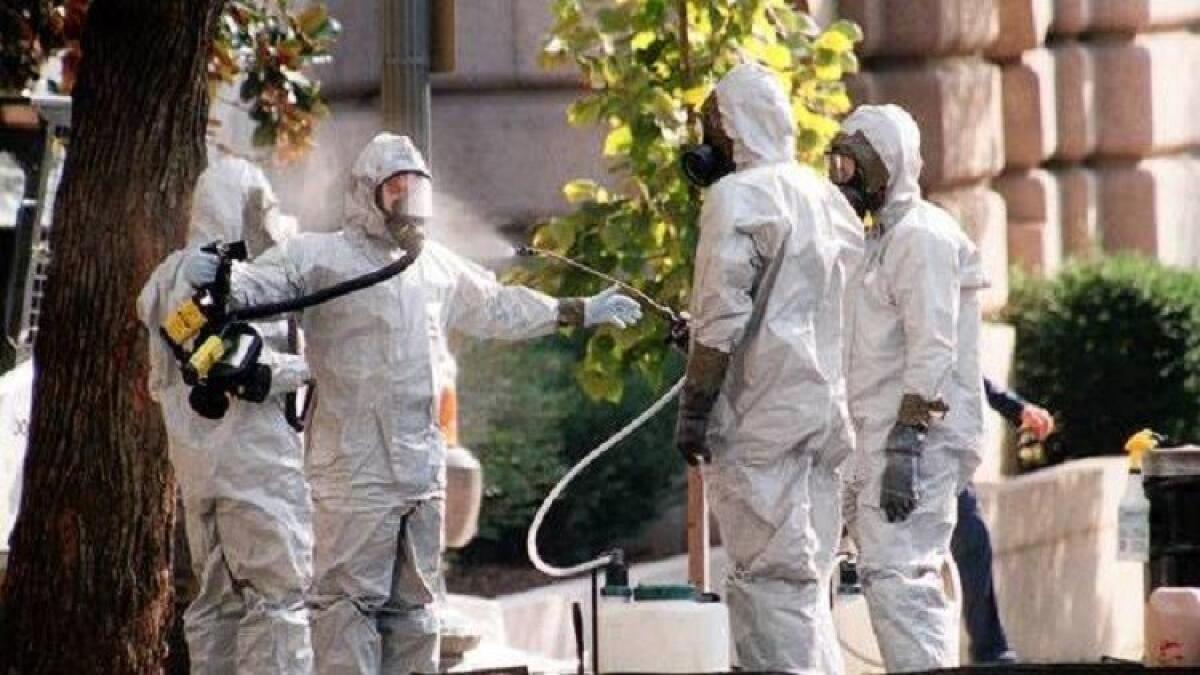Judge bars public from trial over Homeland Security contract for device to detect bioterrorism

- Share via
Reporting from WASHINGTON — A federal administrative judge issued a sweeping order Monday prohibiting members of the public or the news media from seeing any part of a hearing concerning the Homeland Security Department’s cancellation of a contract for a technology aimed at reliably detecting bioterrorist attacks.
The order, issued by Judge Allan H. Goodman of the U.S. Civilian Board of Contract Appeals, also bars lawyers, witnesses or anyone else connected with the case from relaying information about the proceedings.
The judge’s order came in response to Homeland Security lawyers who voiced displeasure with a Los Angeles Times article reporting on the case, according to persons familiar with the matter.
A Silicon Valley company, NVS Technologies Inc., which held the contract, is seeking to establish that the Homeland Security Department acted in “bad faith” in canceling it.
The company’s chief executive, Hans Fuernkranz, was among those who confirmed Monday night that the Homeland Security Department — not the company — sought the order blocking news media coverage of the proceedings.
“We did not initiate it,” said Fuernkranz, who is scheduled to testify. “On advice of counsel, I am unable to comment any further,” he added.
In a brief interview, J. Gregory Parks, an aide to Goodman, termed the judge’s one-paragraph order “fairly comprehensive.”
The judge ordered that proceedings would be closed to the public and that “the record will not be disclosed to the public by the board, counsel, the parties, or anyone else who participates in the proceedings and is privy to the contents of the record.”
Lawyers for The Times plan to challenge the order.
Homeland Security’s lead lawyer on the case, Christopher M. Kovach, did not immediately respond to a telephone message and an email seeking his comment.
The dispute between NVS and the department grows out of an effort by the government to develop technology to accurately and quickly detect attacks using biowarfare agents such as anthrax. The government has spent more than $20 billion over the last 16 years on efforts to protect against potential bioterrorism, with mixed results.
In 2010, NVS won a contract ultimately worth $23.4 million to deliver portable devices that could, in less than one hour, determine whether an air sample contained potential bioterrorism agents.
In February 2014, despite positive assessments of the company’s progress from Homeland Security’s chief medical and science advisor — and other federal scientists whose agencies stood to use the technology — a newly installed official at the department terminated the contract for what he termed the government’s “convenience.”
The cancellation came a few months before NVS was scheduled to deliver its prototypes for advanced testing at three federal laboratories.
The senior Homeland Security scientist, Segaran Pillai, had reported in June 2013 that “NVS has done a tremendous job in fulfilling our requirements.” Pillai, who also is scheduled to testify at the trial, said in his seven-page internal report that continued funding for the project was necessary “to ensure a successful outcome for the nation.”
A division director at the Food and Drug Administration, Sally A. Hojvat, who was in line to decide whether to grant regulatory clearance for the NVS device, was similarly enthusiastic.
“We strongly believe the government must take the initiative to make this happen if we plan to have a highly robust diagnostics and surveillance program to capture a potential biological attack early and also to support the clinical intervention/mitigation and save lives,” she wrote in a Dec. 4, 2013, email to Pillai.
Homeland Security had originally awarded the contract to NVS because of concerns about the slowness and reliability of a nationwide system called BioWatch.
In its first seven years of existence, BioWatch had falsely warned of dozens of germ attacks in major cities — including at the Democratic National Convention in Denver in 2008.
More to Read
Sign up for Essential California
The most important California stories and recommendations in your inbox every morning.
You may occasionally receive promotional content from the Los Angeles Times.











